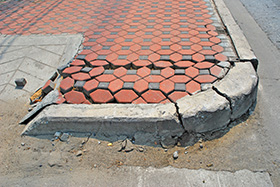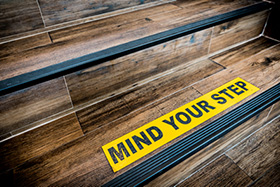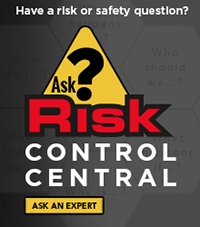Slips, Trips, and Falls
Did you know slips, trips, and falls are one of the greatest personal injury hazards facing your members, guests, and employees? In fact, according to the National Floor Safety Institute, falls are the leading cause of emergency room visits. Overall, approximately 50% of injuries reported by Church Mutual policyholders are the result of slips, trips, or falls.
Any slip, trip, or fall incident brings the potential for your organization to be held responsible for that person’s injury. To protect people from painful and potentially deadly injuries and to protect your organization from liability and unnecessary claim costs, take action to prevent accidents from occurring in the first place.
Exterior

The first exposure people will encounter when visiting your organization will be the exterior of your building. Regularly inspect your exterior grounds to make sure people are safe as they come to your building and as they leave.
- Parking lots and sidewalks: Potholes, cracks, debris, and other hazards should be identified and corrected to prevent accidental injury. Variances in walking surfaces as little as 1/4 of an inch can cause people to trip and fall, so action should be taken to fill small cracks and permanently repair larger holes or cracks. For changes in elevation such as curbs and parking blocks, draw awareness to these hazards by painting them in a visible color such as yellow.
- Exterior steps and ramps: Review the condition of your exterior steps. Make sure handrails are solid and your steps are not cracking or deteriorating. Make sure there is sufficient traction as well.
- Recreational grounds and other areas: Consider all areas people may be walking such as recreational fields, gardens, or emergency exits. Make sure the ground in these areas is even and free from unnecessary obstacles.
- Lighting: Proper lighting is critical to ensuring people are able to safely traverse your parking lot and grounds after dark. Replace burnt-out bulbs in a timely manner and increase lighting where needed.
- Inclement weather: When poor weather strikes, your efforts to maintain your exterior walking surfaces become even more important, especially if you live in a colder climate. When temperatures approach the freezing point, ensure gutters are clear and water run-off does not congregate on walking surfaces where it can freeze and lead to slips and falls. Also, check drains to make sure they are clear. Drain openings should be appropriately sized so they won't cause trips and falls.
When the snow flies, it is important to clear snow and ice as it accumulates. Plan ahead, well before winter, to determine a plan for snow removal. Determine who will be in charge of snow removal and where snow will be moved so that it does not melt and back on walking surfaces. Clear snow and ice as soon as possible and use salt and sand as needed. Document your efforts in a salt and sand log to support your organization should an accident or injury occur.
For more information on preventing slips, trips, and falls outside your building, view our Risk Alert: Parking lots are more than just first impressions.
Interior

There can be just as many slip and fall hazards inside your building as there are outside and the result can be just as severe. Once people enter your building, help them stay on their own two feet by considering these key areas:
- Entry ways: Walk-off mats are important for every entrance to help trap rain, snow, dirt, and anything else being tracked in from outside that may lead to a slip and fall. Make sure mats are long enough to allow people to take several steps on them before stepping off, and ensure mats do not become too saturated with moisture. Read Enter into safety for more information.
- Stairs: Church Mutual policyholders experience more fatalities from slips and falls on stairs than anywhere else. Many of these accidents can be prevented by keeping steps clear of debris and obstacles, ensuring steps and landings are well lit, and making sure steps are appropriately constructed and have sturdy handrails. Read our article Recognizing the importance of slips and falls on steps and stairs to learn more.
- Kitchen: Floors can easily become wet or greasy when the kitchen is in use. This in turn leads to an increased risk of slips and falls. Encourage kitchen works to immediately clean up spills and mop floors regularly. Be sure to minimize clutter on the floor and place non-skid floor mats near sinks and other areas likely to become wet and slippery.
- Other walking surfaces: Be sure to routinely monitor all floor areas for potential hazards such as spills or dampness, torn carpeting, and obstacles such as extension cords. Have warning signs such as “wet floor” readily available to alert people to potential danger. When installing new flooring, consider non-slip or slip-resistant surfaces such as carpet or etched tile.
Review A clear path to slips-and-falls prevention for more information.
Working from heights
Some tasks require assistance to reach items above arm’s length. Whether decorating your facility or working outside, it is important to use the proper equipment to prevent serious injuries from falls. Chairs, tables, or other fixtures should never be used as a substitute for a ladder. Make sure equipment is suitable for the task at hand and is well maintained. Review our ladder inspection checklist for more tips and our article on aerial lifts if using larger equipment. If the job is just too dangerous for your staff or volunteers, don’t hesitate to hire a professional.
Train your people
Beyond correcting physical hazards at your building and grounds, you can also work with your employees and members to help prevent slips and falls. Encourage people to assist in your fall prevention efforts by reporting unsafe conditions such as wet floors or damaged walking surfaces. Ask your staff to wear non-slip footwear and take care when carrying loads. A simple reminder to watch where you’re going while walking and to not use a cell phone while walking may also prevent accidents.







